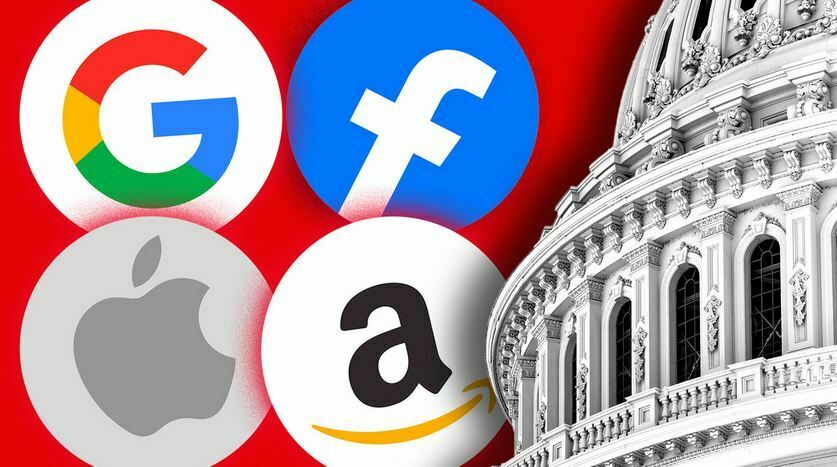
Lawmakers Advance Antitrust Legislation Targeting Big Tech

The House Judiciary Committee advanced five antitrust proposals designed to lessen the power of tech giants including Facebook, Google, and Amazon.
Primary objectives of the big tech antitrust proposals include:
- Prohibit dominant platforms from prioritizing their own products and services. For example, when Alexa asks you to order products from Amazon.
- Stop tech giants like Facebook from acquiring competitors.
- Prohibit tech giants from owning/operating business lines that present conflicts of interests. For example, those that could incentivize a platform to favor its own services.
- Establish new requirements for interoperability and data portability.
- Shift the burden of proof onto dominant platforms to show that proposed mergers do not violate antitrust laws.
- Increase filing fees for mergers worth more than $500 million and decrease fees for merges worth less than $500 million.
- Ensure state attorneys general can remain in the court they choose (for antitrust cases).
- Increase the Federal Trade Commission’s budget.
The big tech antitrust proposals – which will affect platforms with over $600 billion in market cap and at least 50 million monthly users in the United States – are the result of a 15-month antitrust investigation led by Rep. David Cicilline(D-RI). The investigation accuses Facebook, Google, Amazon, and Apple of abusing their market power by charging excessive fees, imposing brutal contact terms, and collecting valuable data from individuals and businesses that rely on them.
Tech giants that could be broken up under the new proposals and have asked lawmakers to reconsider.
“Antitrust laws should promote competition and protect consumers, not punish successful American companies,” said a Facebook spokesperson. “These bills underestimate the unrelenting competition within the tech sector, including competition from foreign companies such as TikTok, WeChat, and Alibaba. The proposed bills aren’t a solution to the ever-changing challenges of the consumer Internet; they are a poison pill for America’s tech industry at a time our economy can least afford it.”
The FTC, now led by antitrust scholar Lina Khan, has already sued Facebook over its acquisition of WhatsApp and Instagram.
Representatives from Google and Amazon have voiced concerns regarding the potential disruption of services. Mark Isakowitz, Google’s Vice President of government affairs, claimed the proposals would force Google to “degrade” services used by hundreds of millions of people.
Brian Huseman, Amazon’s Vice President of public policy, warned the new policies could make it harder for small- and medium-sized businesses that operate through Amazon’s marketplace to find buyers. “Removing the selection of these sellers from Amazon’s store would also create less price competition for products and likely end up increasing prices for consumers.”
The National Venture Capital Association claims the bill affecting merges will result in fewer start-up companies.
Getting purchased by a larger company is often the “most likely liquidity opportunity” for entrepreneurs, argued an NVCA spokesperson. “Barring acquisitions of companies by select acquirers would close the door to this opportunity for many startups, depressing the economics of startup investment, and therefore creating a signifiant disincentive for new company formation.”
Each big tech antitrust proposal has a degree of support from both political parties. However, Republicans seek to add language addressing Big Tech’s anti-conservative bias.
Author’s Note: It’s about time we did something to break up the Big Tech monopolies and lessen the control they have over the economy and our lives.
Sources:
House advances five bills targeting Big Tech after overnight slugfest

























Tech companies started limiting the people’s ideas or thoughts on politics etc if they did not agree with them. NOW THEY CRY POOR ME. YOU ARE DESTROYING MY BUSINESSES.
Typical DEMOCRATIC RESPONSE
How is it that NOT ONE of these proposals has anything to do with preventing these giant tech companies from censoring individuals; making up arbitrary rules to allow them to silence, suspend, ban, and delete users accounts; or recognizes that censorship of anyone because of their political affiliation or support, or posting of information that they disagree with is even going on…??????
This has been the primary discussion in the USA over the the past 4 years or so, and yet it is not even mention once in any of these proposals…
How is it that Congress is actually this negligent not to even mention the primary problem with these big tech companies that has been spoken about, testified about in Congressional Hearings, and written about in newspapers and in articles all over the internet for years now…??????
This is absolutely appalling… and members of Congress should be ashamed of themselves for such irresponsible inaction on their part…
The primary conversation over the last 4 yrs? Why didn’t the Republican lead Congress do something about it?
As far as the subject matter. They are a private company, abide by their terms of service or find a company that will let you spout your ignorance